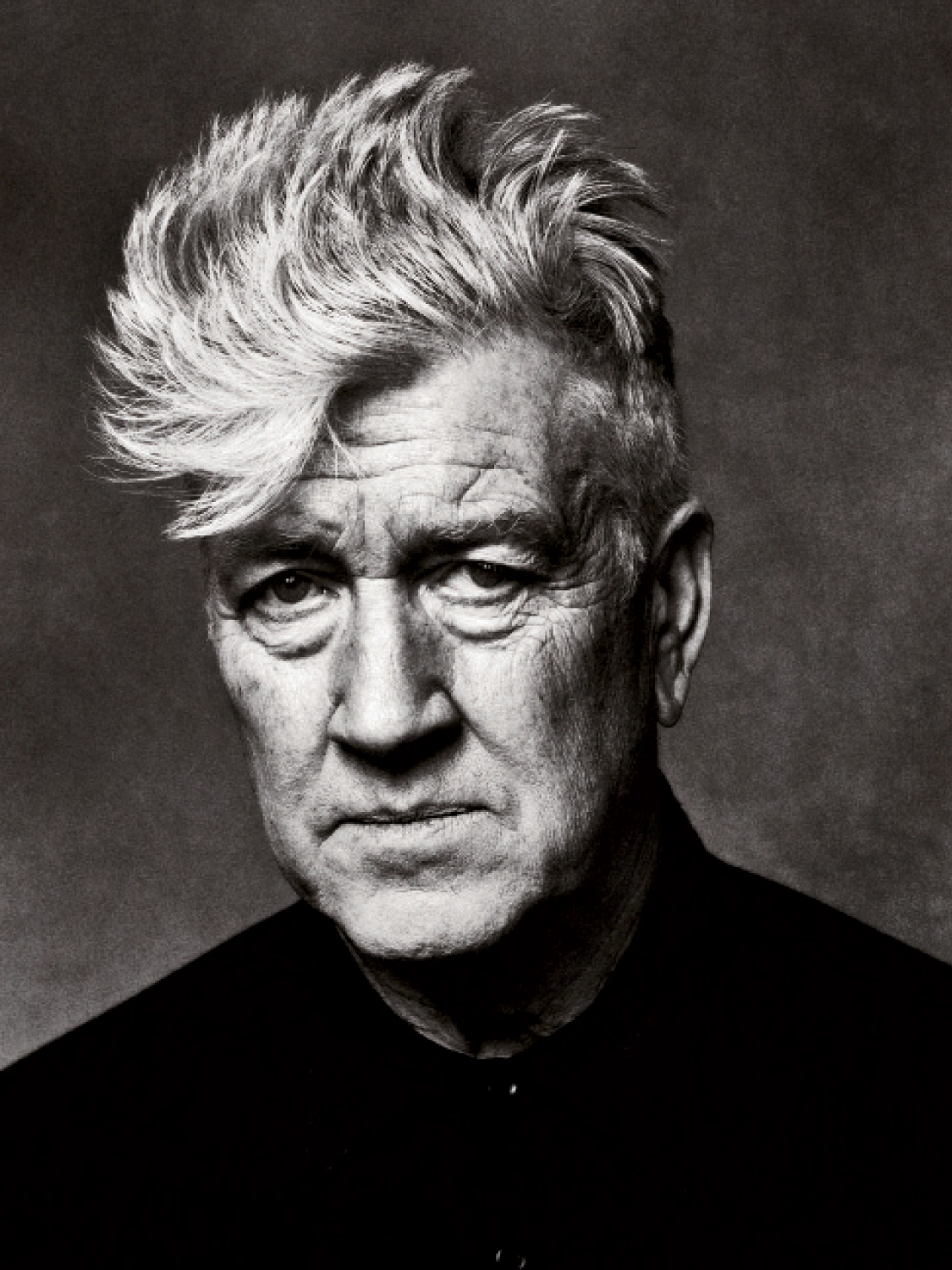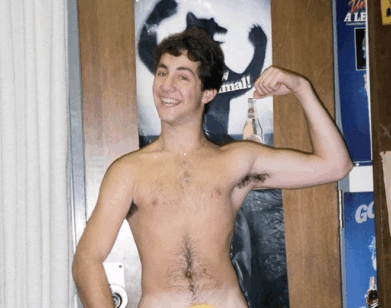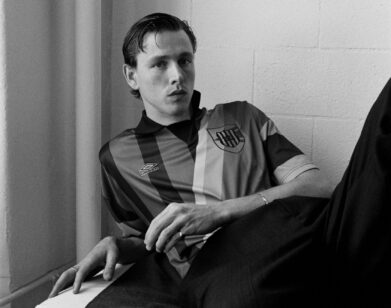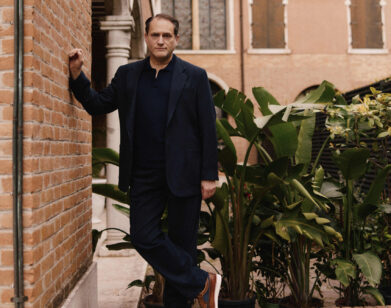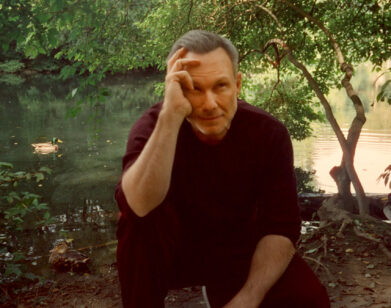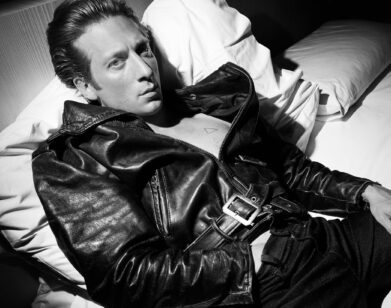Legends: David Lynch
With the 75th anniversary of the iconic sunglasses manufacturer, Ray-Ban underway, INTERVIEW celebrates the NEVER HIDE moments of a few influential leaders in art,fashion, music and film. We’ve met quite a few characters over thedecades, but here are some of our favorite interviewees and icons, artists who never shied away from marching to the beat of their owndrum. Here we take a look at David Lynch:
“Jimmy Stewart from Mars,” is how legendary producer Mel Brooks once described David Lynch. This quote, paired with the first lines of Lynch’s television show, Twin Peaks, which begins “Welcome to Twin Peaks. My name is Margaret Lanterman. I live in Twin Peaks. I am known as the Log Lady. There is a story behind that,” might give you some idea of the delightful, inventive, and multi-layered oddness of Lynch’s work.
David Lynch’s career as a director and writer spans nearly five decades. A graduate of Pennsylvania Academy of Fine Arts, Lynch’s initial interest in film began because he “wanted to make a moving painting.” For Lynch the line between cinema, visual art and music is fluid; “there are so many similarities between the blues and a lot of painting,” he explained. Indeed, Lynch is a master multihyphenate, not only is he the usual mix of writer-director-producer-musician-singer-painter, in recent years he’s also added Parisian nightclub owner, furniture designer, coffee-bean brand owner and lithographer to his resume. “I’ve always said cinema combines so many different art forms. As a kid, I was always building things. My father had a shop in the house, and we built things-we were kind of a project family. I started out as a painter, and then painting led to cinema, and in cinema, you get to build so many things, or help build them. Then cinema led to so many different areas—it led to still photography, music . . .”
It is perhaps this all-embracing and enveloping attitude towards art that makes Lynch’s films so iconic. Whether Lynch’s films scandalized or moved viewers (Blue Velvet in particular did both)—there is no denying that Lynch is an excellent director—Blue Velvet (1986), Mullholland Drive (2001), Eraserhead (1977) are the sort of movies cinephiles name-drop to prove their good taste. And one wonders whether anyone else could make a ludicrous-sounding soap-opera into a gripping, entirely unnerving TV show, often marked as the turning point for Television-from pure fluff, to valid cultural medium.
It’s been six years since David directed his last feature film, 2006’s Inland Empire. Until Lynch’s next film, we shall content ourselves with revisiting our conversations with Lynch and his most memorable characters in the slideshow above.
AGE: 66
HOMETOWN: Missoula, Montana
ADOLESCENT HEROES: I remember one in particular: Bushnell Keeler. Until I met him, I thought that Van Gogh was the last man who painted. [David Lynch, March 1987]
CURRENT HEROES: Francis Bacon is one of my giant inspirations. I just love him to pieces. [David Lynch, January 2012]
BEFORE THE RELEASE OF ERASERHEAD: I supported myself by delivering the Wall Street Journal and doing odd jobs. I love plumbing and carpentry. [David Lynch, March 1987]
LYNCH, THE PAPER BOY: My route took me through two different trash areas. On trash nights, my route would take two hours to do instead of one because I stopped and sorted through the garbage. There are a lot of people who go through garbage, and they’re not stupid people. [David Lynch, March 1987]
FAMILY TIES: I was giving a lecture at UCLA and during the question-and-answer session somebody asked me how my family felt about Blue Velvet. And I didn’t ever think about my kids…I thought about my parents…I don’t think I’ve ever really grown up. There’s a point where your family is below instead of above you, but I’ve never really gotten there. To me, my kids are high-school friends I’ve conjured up. [David Lynch, March 1987]
TRICKS OF THE TRADE: [Frank Daniel] taught me that 70 index cards, with a scene written on each one, equals one feature film. [David Lynch, March 1987]
SPARKS OF INSPIRATION: There’s a little moment that’s very intense. And as it comes up into the light of day, it expands-because it’s been living down deep in my mind under all this pressure. It starts to bob to the surface and it finally becomes filled with all sorts of details. Finally, I see the whole scene, complete with characters.” [David Lynch, March 1987]
THE CRITICS: A film—especially when it’s a personal film—is going to hit somebody or it’s not. There’s nothing you can do about it. [David Lynch, March 1987]
SURREALISM? I love the surrealists, and I sort of understand what they’re saying, but I just think that maybe things aren’t always surreal. To me, a story can be both concrete and abstract, or a concrete story can hold abstractions. And abstractions are things that really can’t be said so well with words. They’re intuited. They’re understood in a different way, and cinema can do those things.
VIOLENCE IN FILM: Most films reflect the world, and the world is violent and in a lot of trouble. It’s not the other way around. The films don’t make a peaceful world violent-the violent world made the films. [David Lynch, January 2012]
THE FRENCH: Paris is now the second-best city in the world for me. The French have been my great friends, and they believe in a director having final cut. They don’t understand any other way. They protect the artist. [David Lynch, January 2012]
AMERICA! I’m an American, and I love America, even with the problems we’ve got. [David Lynch, January 2012]
ELEPHANT MAN (1980): The Elephant Man was such a gift to me. I was a kid from Missoula, Montana, who had made one film at that point that was considered very strange by most people, and here I was in London, England, making a Victorian drama with some of the greatest actors in the world. [David Lynch, January 2012]
BLUE VELVET (1986): I did not feel that Blue Velvet was so strange—in fact, I always said it was my most normal film. It’s an American picture. It deals with human beings and human problems, and it’s the present day and there are cars in the picture. [David Lynch, March 1987]
TWIN PEAKS (1990): I am very close to it, but I sort of have to say good-bye, too. It’s a soap-opera” [The Wild One January 1990]
WILD AT HEART (1990): [It] really is kind of wild because it’s a road picture, a love story, a violent picture, a comedy, and a psychological drama. [The Wild One January 1990]
TRANSCENDENT MEDITATION: You’re swimming in the transcendent twice a day, and when you swim there, the world gets bigger, and you get wet with that, and the creativity grows…You need a mental technique that truly gets you to a field that is beyond the field of relativity. The key word is transcend. Transcendental Meditation is like a key that opens the door to that deepest level of life, that ocean of pure consciousness.
THE EVOLUTION OF FILM: Celluloid, the actual film that runs through the camera, is dead. That’s gone, and now digital is here. But storytelling with cinema never will die—ever, ever, ever. The way the stories are told may change, but it will always be. [David Lynch, January 2012]
A LUMBER OBSESSION? I looked at a map [of North Carolina for Blue Velvet] , and bingo! “Lumberton” leaped out like a frog. I loved the name , and I decided that there were going to be logs and lumber-related items everywhere in the film. [David Lynch, March 1987]
STRANGE THINGS…happen. [David Lynch, March 1987]
Read about more legends HERE.

